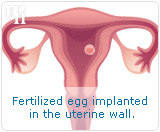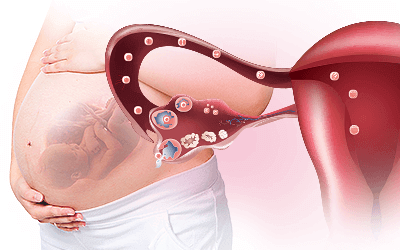
Progesterone is a hormone that stimulates and regulates important functions, playing a key role in maintaining pregnancy and regulating the monthly menstrual cycle.
Progesterone plays an important role in reproductive function and fertility. Produced by the corpus luteum, progesterone is essential for building and maintaining the lining of the uterus, which allows a fertilized egg to be implanted in the uterine wall. Progesterone levels increase after ovulation, effectively increasing a woman's likelihood of conception. Read on to learn more about progesterone and its affect on fertility.
What Is Progesterone?
Progesterone is a hormone produced in the body to help regulate the menstrual cycle. Men also produce small amounts of the hormone, but it is not as important for sexual maturity as testosterone. Working in tandem with estrogen, progesterone helps maintain the balance of a woman's monthly menstrual cycle.
Progesterone is a precursor to many other steroidal hormones including testosterone and estrogen. Because it also acts as a modulator, it is often used to promote hormonal balance. Progesterone supplements help stimulate bone growth and strength which protect against osteoporosis.
As well as enhancing fertility, progesterone has other functions which include reducing swelling and inflammation, stimulating the production of the thyroid, helping in immunity and normalizing blood clotting levels.

Side effects of too much or too little progesterone can cause health problems. An excess of progesterone can cause tiredness and even sedation. If progesterone levels are deficient or absent, as is the case with ovarian anovulation, irregular and heavy menstrual bleeding is a usual occurrence after a period cycle without menstrual bleeding.
How Does Progesterone Affect Pregnancy?
Prior to ovulation, progesterone is produced to improve the chance of becoming pregnant. A rise in levels before ovulation faintly raises the body temperature, increasing the amount of mucus in the vagina. This increases the chances of sperm surviving and reaching the uterus to fertilize an egg.
If a woman becomes pregnant, rising progesterone levels prevent the premature shedding of uterine lining (pro-gestation). During pregnancy, the main production of progesterone is transferred to the developing placenta around week eight of the pregnancy. Usually progesterone levels in a pregnant woman are 10 times higher than in a woman does not become pregnant.
If a woman does not become pregnant, hormonal levels begin decreasing after ovulation, resulting in shedding of the uterine lining. Click on the link below to find out more about progesterone.


